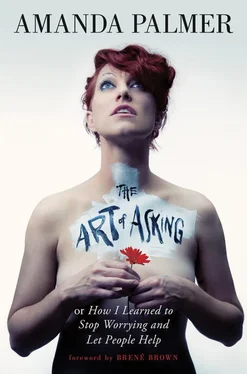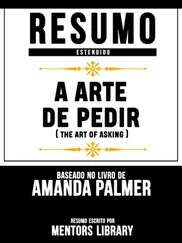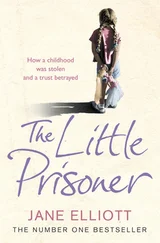I’d learned that it was pointless trying to tell these people what their music had meant to me . It meant everything. Their songs were the landscape of my inner life. I was modeling my own style of songwriting after theirs. It would just sound trite if I tried to explain it out loud.
But I could make them eggs.
• • •
By 2002, Brian and I were touring more and more, and we started earning real cash money at the shows. At the end of each night, the fans would ask us for CDs, but for a while we had nothing to sell besides some T-shirts and a bumper sticker that we had designed ourselves. No music.
The ability to burn CDs was a brand-spanking-new technology. So instead of taking our first cheap recording to a duplication house, we decided it would be more economical to just burn our own.
We made our first recording for free, thanks to a sound-engineer friend who snuck us into a studio after hours. I pasted together a collage I’d assembled out of old paper dolls to use as our album artwork, while Brian made endless OfficeMax runs in The Vulva to purchase boxes of blank CDs and empty jewel cases. We sat in the kitchen burning batches of our songs in a three-disc CD tower. On a good day we could make a few hundred discs, and we only needed a few dozen at a time to sell at shows: five songs for $5. The fans were eager to have them and they sold really well. Soon, my whole apartment in the Cloud Club—which was small to begin with—turned into a CD-assembly workshop. I got very friendly with the local post office, where we stood in line two or three times a week to ship batches of records to our fans with handwritten thank-you postcards. The fans used my home address to order everything. They paid by personal check and we sent the CDs before the checks cleared (or didn’t).
Meanwhile, I worked weekends as The Bride, got the stripping job as well, and Brian took shifts at the MIT student center branch of Toscanini’s, where he asked for and received Gus’s kind blessing to make a display stand for our CD at the register. At every shift, he wound up selling a few CDs to ice-cream customers.
GET THEIR EMAILS! I’d remind him.
He did. A good percentage of our initial hardcore fanbase was MIT grad students and professors, who stood happily at our gigs next to the twenty-two-year-old punk kids with their pierced septums and turquoise dreadlocks. Brian and I took great pleasure in the fact that we seemed to have created the most eclectic community of fans in Boston: art college students, vegan punks, drag queens, metalheads, academics, people who listened to National Public Radio. That meant the world to us. We didn’t want to tap a particular crowd—we didn’t want to be a hip indie band or a goth band. We wanted the people who came to the shows to feel like they were part of our weird little family, that they would never be turned away at the door for not being cool enough. Brian and I had both been insecure freaks in high school; we’d already spent our entire lives on the outside of that door, and we didn’t just want to gain entrance. We wanted to smash the door down completely.
• • •
Things started to catch ablaze. We couldn’t quit our jobs yet, but we were close. We won the local Boston battle of the bands. I quit smoking, because I wanted to take care of my voice, which I was constantly losing. We drove the van, we gigged, we drove, we ate metric tons of bad gas-station food, we drove, we soundchecked, we drove some more, and when we needed to sleep, we slept on the couches of old friends, out-of-town family, local fans, or crashed with other bands. In a pinch, we got a cheap motel or slept in the van, which was tricked out with a futon in the back.
In turn, we hosted countless musicians and friends at the Cloud Club, whether they were playing shows with us or not—it was a karmic couch-circle. I’d get photos emailed to me on the road of bands in the back garden, bands on the roof, bands in the bathtub. Bands left thank-you notes, drawings, books, CDs behind as gifts.
Our fanbase grew slowly but steadily. We’d go to a city—Philly, Portland, Northampton, DC—and play to fifty people, then a hundred and fifty, then three hundred. Word spread. The email list grew. We still had no manager, no agent.
Sometimes, if we didn’t have a place to crash, we’d just ask from the stage.
HANDS UP IF YOU CAN LET US SLEEP AT YOUR HOUSE TONIGHT .
We’d thank our hosts with CDs, T-shirts, tour stories, and our endless gratitude.
We made some wonderful friends that way.
One of those friends was a photographer in Philadelphia named Kyle Cassidy, a classic couch-patron who had been enthusiastically letting bands crash in his home for years. We sometimes shared space at Kyle’s with other bands passing through town, trading stories over group breakfasts. That house became a dependable haven after our Philly gigs and, since he loved capturing the band and we trusted him, Kyle also became our default official band photographer. If I knew a band was touring through Philly, I’d send them to Kyle and he’d take them in without question.
I started a computer list of our few dozen dependable couchsurfing hosts, organized by city. Kyle in Philly. Brian’s dad in New Jersey. His aunt in St. Louis. Josh and Alina in New York. Xanna and her girlfriend in Atlanta. Clare and Brian in Montreal. Emily in Brooklyn. My dad in Washington, DC. Kate in Chicago…
• • •
DIY is a tricky term.
I’ve been called the “Queen of DIY,” but if you’re really taking the definition of “Do It Yourself” literally, I completely fail. I have no interest in Doing It Myself. I’m much more interested in getting everybody to help me.
I think a better definition might be UWYC: “Use What You Can.” It is, unfortunately, not a very catchy term.
Everybody has access to different tools, people, resources, situations, opportunities. If you’re privileged enough to have family well-off enough to loan you money for your first recording? TAKE IT.
If you have a friend with a shack on the beach who’s offering you a quiet place to write? TAKE IT.
There’s really no honor in proving that you can carry the entire load on your own shoulders. And… it’s lonely.
Maybe we can break DIY mentality into two camps, because “collective” work doesn’t actually blow everybody’s dress up.
“Minimal DIY” is the kind of DIY where you literally try to Do It Yourself . The emphasis is on total self-reliance and individualism.
Don’t have the right kind of microphone? Use a different one .
Don’t have a huge budget for food/can’t afford takeout/have no kitchen? Just buy a box of ramen in bulk and cook it in the coffeemaker you got for $5 at a yard sale .
Can’t afford to hire a full choir of people? Don’t use a choir. Your song doesn’t need it and it’ll sound pompous and pretentious anyway. Or, if you must, record your own voice fifty times, singing slightly differently at different spots in the room .
Car runs out of gas on a long stretch of road? Grab the empty canister out of your trunk and start walking, sucker .
Then there’s “Maximal DIY,” which is more about expansion and asking. The emphasis is on collectivism; you throw the problem out to your circles to see what solutions will arise.
Don’t have the right kind of microphone in your studio? Use Twitter, shouting towards the musicians and studios; some kind person may lend you the right one .
Don’t have a huge budget for studio food? Ask if anyone local feels like helping/cooking/bringing you leftover food from their job at the bakery .
Читать дальше












